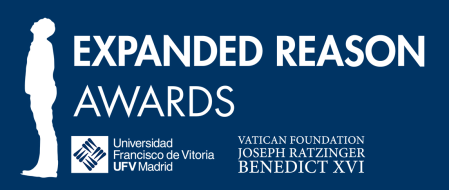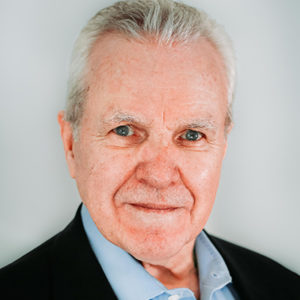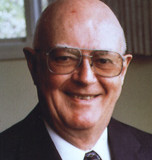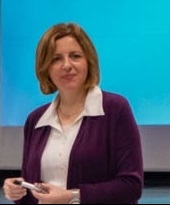IFI News
Dr. Robert Enright and Dr. Richard Fitzgibbons Receive 2019 International Research Award
Two members of the International Forgiveness Institute (IFI) Board of Directors have been selected to receive an international award recognizing their Forgiveness Therapy research. Dr. Robert Enright, founder of the IFI, and Dr. Richard Fitzgibbons, MD, Director of the Institute for Marital Healing just outside Philadelphia, PA, have been named the 2019 recipients of the Expanded Reason Award.

The prestigious award is presented annually by the University Francisco de Vitoria (Madrid, Spain) in collaboration with the Vatican Foundation Joseph Ratzinger/Benedict XVI (Rome, Italy) “to recognize and encourage innovation in scientific research and academic programs.”
Recipients (only two researchers are selected worldwide each year) are determined by an international panel of seven judges who examine books and journal articles to ascertain who across the globe is conducting innovative and exceptional research that cuts across the social sciences. The award criteria includes the challenge of establishing a dialogue of particular sciences with philosophy and theology in line with the thought of Pope Benedict XVI who led the Catholic Church from 2005 – 2013.

Dr. Richard Fitzgibbons
Drs. Enright and Fitzgibbons co-authored the book Forgiveness Therapy: An Empirical Guide for Resolving Anger and Restoring Hope. The book, published by the American Psychological Association (APA) in 2015, signifies that Forgiveness Therapy is now rightfully taking its place alongside such historically accepted therapies as Psychoanalysis, Humanistic Psychotherapy, and Cognitive Behavioral Therapy.
Forgiveness Therapy is actually a new and updated version of a previous book by Drs. Enright and Fitzgibbons, Helping Clients Forgive, that was published in 2000, also by the APA. The new 358-page volume helps clinicians learn how to recognize when forgiveness is an appropriate client goal and provides concrete methods for working forgiveness into therapy with individuals, couples and families. It is grounded in theology, philosophy, psychiatry, education and the social scientific method.
Dr. Fitzgibbons is a long-time research associate of Dr. Enright’s. Trained in psychiatry, he has worked with hundreds of couples over the past 40 years. His book, Habits for a Healthy ![]() Marriage: A Handbook for Catholic Couples, is available at Amazon.com.
Marriage: A Handbook for Catholic Couples, is available at Amazon.com.

Dr. Robert Enright
Dr. Enright, in addition to founding the IFI 25 years ago, has been a professor with the University of Wisconsin-Madison School of Education’s highly-regarded Department of Educational Psychology since 1978. He is the author or editor of seven books and more than 150 publications on social development and the psychology of forgiveness. He pioneered forgiveness therapy and developed an early intervention to promote forgiveness–the 20-step “Process Model of Forgiving.”
Both Dr. Fitzgibbons and Dr. Enright have been invited to attend and formally accept their awards at the Expanded Reason Awards Ceremony on Sept. 19, 2019 at the University Francisco de Vitoria in Madrid.
The Expanded Reason Awards recognize extraordinary teachers and researchers.
The Awards Ceremony is part of the 3-day International Expanded Reason Congress in Madrid that brings together university researchers and teachers from all over the world. The Congress seeks to deepen the dialogue among science, philosophy, and theology through presentations, roundtable discussions, and workshops. Dr. Fitzgibbons and Dr. Enright will be outlining the concepts behind their winning project in a talk that will also be published in the official proceedings of the Congress.♥
Reflections for the 25th Anniversary of Our International Forgiveness Institute, Inc.
It was the early 1990’s and I just recently did an interview for a Chicago newspaper. The journalist published my home telephone number within the article. For the next two weeks, it seemed as if the phone just would not stop ringing. The people who called were seeking information about how to forgive. “There is a genuine hunger out there for people to know how to go about forgiving,” was my conclusion to family and colleagues.
about how to forgive. “There is a genuine hunger out there for people to know how to go about forgiving,” was my conclusion to family and colleagues.
Because we had published the first-ever empirical article on forgiveness in a peer-reviewed journal article only a few short years before this, in 1989, there was little out there instructing people on how to forgive those who have deeply hurt them. Because of the ground-breaking work of Msgr. John Hebl, with whom I had the honor of publishing the second-ever empirical article on forgiveness in a journal, in 1993, there was emerging scientific support for our Process Model of Forgiveness.

William Walker
About this same time, the late and great Dr. William Walker of Madison, who ran radio stations, wrote a letter to me (email was not big yet). He explained that many years ago, he received his doctoral degree from the Department of Educational Psychology at the University of Wisconsin-Madison, where I was (and am) a professor. Dr. Walker explained to me that he was drawn to our forgiveness work, had the financial means to bring this to an important level, and he had an interest in joining the research. I enthusiastically agreed and a strong collegial relationship and friendship developed.

Tom Walker
When my dear friend William passed away, his son Thomas Walker took up the cause and provided the necessary funding to keep the IFI viable and expanding, as he does to this day.
Thank you, William and Thomas!
Given that we were getting some financial support and the many requests for forgiveness information continued, some of my colleagues and I decided to try to form an entity with the goal of serving people who wanted information on how to forgive. This was to start as a service entity for all who were interested in forgiving.
Our little group decided to take the non-profit route and developed the 501(c)3 entity, the International Forgiveness Institute, Inc. (IFI) in Madison, Wisconsin in 1994. A Board of Directors was formed to help guide the development of this organization. Thank you, Board Members, for your dedicated service to our IFI! At the time of its formation there was nothing “international” about this organization. Yet, it was the vision, the promise of such expansion, that led to our keeping that word “International” in the title. We, of course, started small, without even a website.
International Forgiveness Institute, Inc. (IFI) in Madison, Wisconsin in 1994. A Board of Directors was formed to help guide the development of this organization. Thank you, Board Members, for your dedicated service to our IFI! At the time of its formation there was nothing “international” about this organization. Yet, it was the vision, the promise of such expansion, that led to our keeping that word “International” in the title. We, of course, started small, without even a website.
A major turn occurred for us at the beginning of the 21st century. Because our work was having success in the mental health field with our Process Model of Forgiveness, I had an idea: Why not start to introduce forgiveness to children and adolescents? After all, if they will experience injustices, perhaps even severe injustices in this world, why not equip them with the scientifically-supported approach of forgiveness to reduce the resentment, caused by the injustices, so that they can be resilient in their emotional well-being and in their healthy family interactions?
With the idea of prevention in mind, we decided to build forgiveness curricula for children, starting in first grade (age 6 and 7). We did so through age-appropriate children’s stories, such as Dr. Seuss’ Horton Hears a Who. The children, in their own classrooms, then begin to see what forgiveness is, how story characters navigate interpersonal conflict, and what happens when people forgive. We piloted this curriculum for the first time in Belfast, Northern Ireland, did the research on this endeavor through the university, and published the first empirical evaluations of this work in 2007.

Primary 3 students at Holy Family Primary School in Belfast celebrate their “Forgiveness Graduation.”
The results were dramatic! Children, upon hearing stories and reflecting on the theme of forgiving, actually reduced in their own anger. Teachers saw greater cooperation among students in classrooms and teachers reported to us that they, themselves as teachers, improved in their own teaching skills as a result of being a forgiveness instructor.
The Forgiveness Education project grew to such an extent that we now have a complete set of curriculum guides from pre-kindergarten (age 4) all the way up to the end of high school (age 18), including an anti-bullying guide and two guides for parents: A Family Guide (for those with primary-aged children) and Strengthening Families (for those with middle-school aged children). Dr. Jeanette Knutson, Amber Osmulski, and Dr. Matthew Hirshberg helped to craft these guides. Thank you, Jeanette, Amber, and Matthew!
 The Forgiveness Education curriculum guides have been ordered by educators from over 30 countries across the world. Other international endeavors include both the Jerusalem Conference on Forgiveness and the Rome Conference on Forgiveness and a new Forgiveness Education initiative in Bethlehem in the Middle East. Thank you, Mr. Thomas and Terri Lucke, for your generous funding! We now, I think, have earned the word “International” in our organization’s title.
The Forgiveness Education curriculum guides have been ordered by educators from over 30 countries across the world. Other international endeavors include both the Jerusalem Conference on Forgiveness and the Rome Conference on Forgiveness and a new Forgiveness Education initiative in Bethlehem in the Middle East. Thank you, Mr. Thomas and Terri Lucke, for your generous funding! We now, I think, have earned the word “International” in our organization’s title.
Our long-time Director at the IFI, Dennis Blang, has been instrumental in sending far and wide information about the Forgiveness Education guides, in maintaining our website, publishing the Forgiveness News, crafting the electronic newsletters, and overseeing the everyday important activities of our institute. Thank you, Dennis! And thank you to our earlier Directors, Dr. Gayle Reed and Mary Mead!
The service work has expanded so that we now are serving homeless people, those in prisons, and we have started a bumper-sticker campaign, “Drive for Others’ Lives” as a way to help make the roads a more civil environment. Many of these new ideas come from our stellar volunteer at the IFI, Jacqueline Song. Thank you, Jacqueline!
A big thank you goes out to our long-term President, Roy Lloyd, and to our Ethics Committee members for their dedicated work in examining our protocols that impact the homeless, those in prison, and others. Thank you to those “on the ground” who oversee important forgiveness programs in Belfast (Leah Judge), Greece (Dr. Peli Galiti), and Monrovia, Liberia (Rev. Kortu Brown and Mr. George Cooper). We want to thank all who have financially contributed to our efforts over this quarter-of-a-century.
 We started with one idea: Forgiveness is important as it can quell unhealthy anger and improve mental health and relationships. Many are catching on to this idea. In our humble opinion, forgiveness should now become a natural part of families, schools, organizations, and individual hearts for the good of humanity.
We started with one idea: Forgiveness is important as it can quell unhealthy anger and improve mental health and relationships. Many are catching on to this idea. In our humble opinion, forgiveness should now become a natural part of families, schools, organizations, and individual hearts for the good of humanity.
Long live forgiveness!
Robert
This 3-Year-Old’s Explanation of Forgiveness is Simply Brilliant!
Kids say the darnedest things. But when 3-year-old Holland, the daughter of blogger Mary Katherine Backstrom, explained what “forgiveness” means, she did it in a beautifully heartfelt and simplistic way. And while kids are known for their outlandish statements (seriously — where do they hear these things?!), this little girl happened to be pretty accurate with her definition, single-handedly reminding us all to soften our hearts a little more often.
Teaching Forgiveness to “the poorest of the poor” Around the World
Editor’s Note: Dr. Robert Enright, the man Time magazine called “the forgiveness trailblazer,” just returned from a European forgiveness-teaching tour that included sessions in Edinburgh, Scotland; Belfast, Northern Ireland; and Rome, Italy. Here is an update on his activities in the first of those locations:
Edinburgh, Scotland – Earlier this year, Dr. Robert Enright and colleagues began a two-phase forgiveness research project with homeless individuals in Edinburgh. Many of those individuals receive services from the Missionaries of Charity, a Roman Catholic congregation of women dedicated to the poor, that has taken a strong interest in the forgiveness project and that has become a full-partner with the IFI in the Edinburgh research initiative.
The Missionaries of Charity was founded more than 60 years ago by the late Mother Teresa, now known as Saint Teresa of Calcutta. She won the Nobel Peace Prize in 1979 for her humanitarian work with those she characterized as “the poorest of the poor.”
Initially established in Calcutta, the organization quickly expanded into countries outside India and at the time of her death in 1997, Mother Teresa had created over 750 homes in more than 135 countries, providing food pantries, orphanages, homes for AIDS patients and people with leprosy, as well as shelters for battered women, people addicted to drugs, and the poor.
The religious order has now grown to more than 6,000 Missionaries of Charity Sisters, 400 Missionaries of Charity Brothers, 40 Missionaries of Charity Fathers (priests), and 100,000 Lay (non-religious) Missionaries of Charity volunteers. Their services are provided, without charge, to people regardless of their religion or social status.
As part of the Edinburgh campaign, Dr. Enright and others are collaborating with Missionaries of Charity volunteers who are in the process of conducting interviews and administering a variety of anger, injustice, worth, and dignity scales to men and women who do not have stable home situations in Edinburgh.
“So far, we are seeing two distinct patterns emerge from those interviews and self-assessments,” Dr. Enright says. “One of those behavior patterns is pretty much what we expected but the second one presents a significant challenge related to how we address it through an appropriate forgiveness intervention.”
Most or the homeless interviewed in Edinburgh are deeply hurting because of past injustices/trauma and about one-third of them readily admit to being treated unjustly and they admit their pain, according to Dr. Enright. “These are the ones, we think, who may significantly benefit from having a forgiveness program,” he adds.
The second group, again about one-third of those interviewed, are characterized by Dr. Enright as deeply hurting because of past injustices–a pain that is so traumatic that they are not quite yet ready for forgiveness programs because they are in deep denial about what happened and about their depth of pain.
“I think this denial of the pain, the inability to yet see it and face it, keeps them imprisoned in their homeless pattern,” Dr. Enright observes. “They need much love and encouragement to break through their own barriers so that they can confront the injustice, forgive, heal, and then become resilient.”
Dr. Enright and colleagues are in discussions with the Missionaries of Charity volunteers about the structure and the Edinburgh-specific refinements for the forgiveness intervention that will be deployed in phase two of the project. Those guidelines could establish a precedence for a world-wide set of forgiveness interventions for the poor with direct instruction for both adults and children.
Members of the Missionaries of Charity order designate their affiliation using the initials, “M.C.” A member of the congregation must adhere to the vows of chastity, poverty, obedience, and a fourth vow, to give “wholehearted free service to the poorest of the poor.” They are identified by wearing the traditional white religious habits with blue trim. In the U.S., a full 20% of American nuns are members of the Missionaries of Charity.
In Scotland, homelessness is called “rough sleeping.” For those rough sleeping, the risk of assault and theft are high. The weather can do real damage to their health and the stress of survival living takes a huge toll on their mental and physical health. The estimated lifeexpectancy of a rough sleeper is 43, pretty much half that of the general population.
The Homelessness and Rough Sleeping Action Group (HARSAG) was set up in 2017 to recommend to Scottish Government Ministers the actions and solutions needed to eradicate rough sleeping and transform the use of temporary accommodation in Scotland. The group’s final report, issued in June 2018, says that “homelessness must be seen as a public health priority” and makes more than 70 recommendations on ending homelessness in Scotland including those on welfare reform, ensuring adequate affordable housing, homeless assessment and intervention (much like the IFI is doing in Edinburgh), tackling child poverty, and others. ◊
- Read the HARSAG Final Report “Ending Homelessness in Scotland.”
- Watch a 4:53 video of Mother Teresa’s Biography and Life Story.
- Learn more about the Missionaries of Charity.
Forgiveness Workshop Inspires National Movement in Greece
If you’re wondering whether attending one of Dr. Robert Enright’s workshops can truly make a difference in your life, you’ll want to read a fascinating article about one participant who has as her goal spreading forgiveness throughout her homeland of Greece — Dr. Kalliopi (Peli) Galiti.
Since taking the course in 2012, Dr. Galiti has influenced thousands of Greek teachers and students to practice the life-altering virtue of forgiveness.
Dr. Galiti has translated Dr. Enright’s Forgiveness Education curriculum from English to Greek and written two Greek-language forgiveness books that are being used in the country’s school system. She is now a visiting scholar at the University of Wisconsin-Madison and travels to Greece three times per year to continue teaching educators about forgiveness. .
.

 Dr. Robert Enright, founder of the International Forgiveness Institute and the man Time magazine called “the forgiveness trailblazer,” has authored more than 60 forgiveness-related blog posts for
Dr. Robert Enright, founder of the International Forgiveness Institute and the man Time magazine called “the forgiveness trailblazer,” has authored more than 60 forgiveness-related blog posts for 


